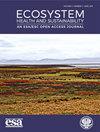基于GA-BPANN模型的区域生态系统健康评价——以云南省为例
IF 3.4
2区 环境科学与生态学
Q1 ECOLOGY
引用次数: 6
摘要
摘要背景:区域生态系统健康评价是社会可持续发展的基础。然而,生态系统是生态系统马赛克和相互影响的子系统的复杂集成,使得使用传统的线性和显式函数评估方法难以对其进行评估。采用遗传算法优化的反向传播神经网络模型,对云南省16个地区的生态系统健康状况进行了评价。结果:(1)该模型对复杂非线性系统的评价投入少,避免了主观权重的需要,在区域生态系统健康评价中具有较好的实际应用效果。②2000-2020年云南省生态系统健康水平呈上升趋势,且存在显著的正空间自相关关系,表明生态系统健康水平较高的区域集聚在一起,区域生态保护政策产生了扩散效应,导致周边地区生态健康水平不断提高。由于局部健康水平的不稳定性增加,生态系统健康的高-低离群区应得到更多的关注。结论:本研究为区域尺度上不同生态系统的空间镶嵌性评价提供了方法探索。本文章由计算机程序翻译,如有差异,请以英文原文为准。
Regional ecosystem health assessment using the GA-BPANN model: a case study of Yunnan Province, China
ABSTRACT Background: Regional ecosystem health assessments are the basis for the sustainable development of society. However, an ecosystem is a complex integration of ecosystem mosaics and subsystems that influence each other, making it difficult to evaluate them using traditional assessment methods of linear and explicit functions. We introduce a back-propagation neural network model optimized by a genetic algorithm to evaluate ecosystem health in 16 districts in Yunnan Province. Result: (1) The model required fewer inputs to evaluate complex and nonlinear systems, avoided the need for subjective weights, and performed well in this practical application to regional ecosystem health assessment. (2) The ecosystem health in Yunnan Province was increasing, and there was a significant positive spatial autocorrelation during 2000–2020, showing that districts with high Ecosystem Health cluster together and the ecological protection policy of the region has produced a diffusion effect, leading to continuous improvement of the ecological health of the surrounding areas. High-low outlier areas of ecosystem health should be paid more attention, because of the increasing instability of local health levels. Conclusion: This study provides a methodological exploration for assessing spatial mosaics of different ecosystems at a regional scale.
求助全文
通过发布文献求助,成功后即可免费获取论文全文。
去求助
来源期刊

Ecosystem Health and Sustainability
Environmental Science-Management, Monitoring, Policy and Law
CiteScore
7.10
自引率
2.00%
发文量
40
审稿时长
22 weeks
期刊介绍:
Ecosystem Health and Sustainability publishes articles on advances in ecology and sustainability science, how global environmental change affects ecosystem health, how changes in human activities affect ecosystem conditions, and system-based approaches for applying ecological science in decision-making to promote sustainable development. Papers focus on applying ecological theory, principles, and concepts to support sustainable development, especially in regions undergoing rapid environmental change. Papers on multi-scale, integrative, and interdisciplinary studies, and on international collaborations between scientists from industrialized and industrializing countries are especially welcome.
Suitable topics for EHS include:
• Global, regional and local studies of international significance
• Impact of global or regional environmental change on natural ecosystems
• Interdisciplinary research involving integration of natural, social, and behavioral sciences
• Science and policy that promote the use of ecological sciences in decision making
• Novel or multidisciplinary approaches for solving complex ecological problems
• Multi-scale and long-term observations of ecosystem evolution
• Development of novel systems approaches or modeling and simulation techniques
• Rapid responses to emerging ecological issues.
 求助内容:
求助内容: 应助结果提醒方式:
应助结果提醒方式:


